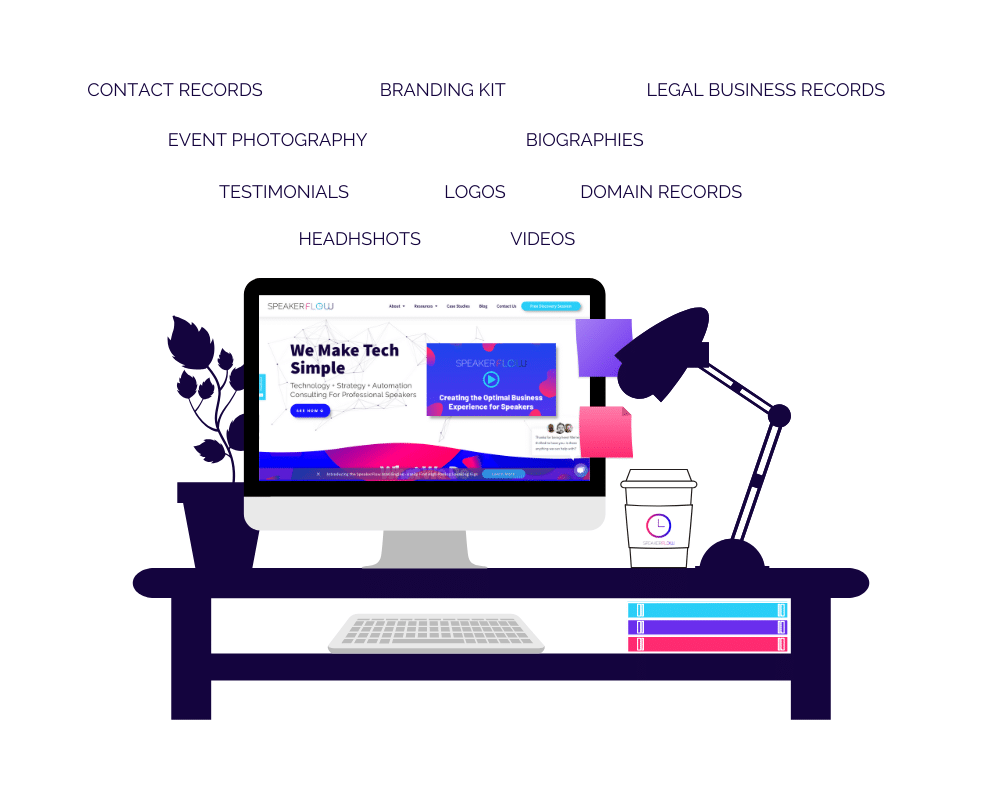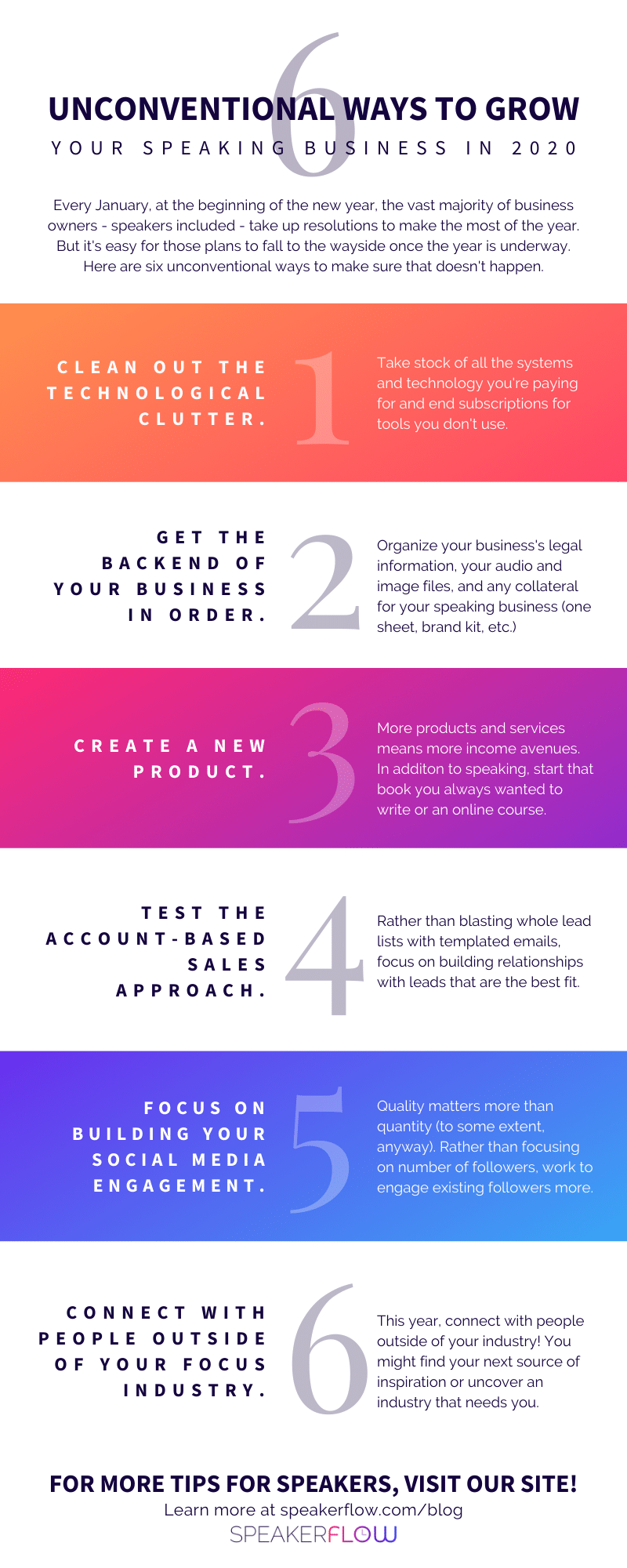In these first few days of January, you may have adopted a resolution or two in an effort to grow your speaking business or your personal life in the new year. For new speakers especially, these goals may focus on building their speaking business so much so that it becomes a full-time gig (no joke intended). But, a large part of the time, regardless of the type of resolution, most are abandoned within a month or two. In fact, according to a 2015 study from The Nielsen Company, more than half of people that make New Year’s resolutions give up on them. To be exact, only 64% of resolution-makers keep them past the first month, and only 46% keep them past the six-month mark.
In other words, we’re all motivated to become better at what we do and who we are, but we struggle to maintain that motivation. This is true regardless of the industry you’re in or the resolution you choose. However, this isn’t necessarily a bad thing! In the words of Theodore Roosevelt, “Nothing in the world is worth having or worth doing unless it means effort, pain, difficulty… I have never in my life envied a human being who led an easy life. I have envied a great many people who led difficult lives and led them well.”
All of that said, here at SpeakerFlow, we couldn’t agree more. That’s why, this year, we’ve outlined six unconventional steps to take in your own speaking business. From a few common-sense tips to some lesser-known advice, we’re here to help you grow your speaking business. What do you say? Let’s make 2020 the year to beat. 😊
Clean out the technological clutter.
Let’s start with the not-so-surprising steps to growing your speaking business. Before anything else, stop paying for systems you’re not using. As virtual businesses, it’s easy to start a free trial for a new tool with high hopes. From there, it’s also easy to forget the trial and get billed for the tool even though you’re not actually using it.

To prevent this, we recommend creating a record for software expenses. Here, you can track each new trial along with the date it expires. You can also track the monthly or yearly recurring expenses of your tools. That way, if you need to check or cut back on the tools you have, you can decisively do so. Additionally, seeing it all at once allows you to take stock of systems you could be using more. For example, when we created SpeakerFlow CRM on Zoho One, we realized it could replace many of our other tools. From email campaigns to esignatures to social scheduling, we were able to do it all within Zoho One for a single monthly fee. As a result, we not only reduced our expenses. We also simplified our workflow, improving our efficiency.
In your own speaking business, you can knock this out one of two ways: a simple spreadsheet or a project management system. On the SpeakerFlow side, we’re huge fans of Asana. However, although we think it’s the best project management system out there, the important thing to remember is the desired outcome. Regardless of whether you choose a spreadsheet or a project manager to track expenses, both options allow you to see what you’re paying for and if it’s worth it. That way, this year, you can easily clean out the clutter and end subscriptions for tools you’re not using.
Get the backend of your business in order.

That brings me to the second step in growing your speaking business: get your sh*t together. I say this a lot and for good reason! I can’t personally vouch for the old adage, “A cluttered desk means a cluttered mind.” However, every successful business owner – speaker or otherwise – will tell you that being organized never hurts. From legal documents to speech materials, the more coordinated you are now, the smoother the sailing will be as moving forward.
Admittedly, organizing may not be the most thrilling way to grow your speaking business. That said, there are countless benefits to doing so. We already covered the first one, the money you can save by cutting out tools you don’t use. The real reasons to do it aren’t money-related, however, and include the ease with which someone else can hire you. After all, the more quickly and confidently you can say, “Here is a list of my top clients” or “Here is my speaker one sheet,” the more easily an event planner can work with you. Ultimately, that makes you a better speaker for each client, making each one more likely to write you a testimonial or refer you future business.
The last benefit of getting organized is being better prepared to hire someone yourself. Collectively, there are three primary tiers of any speaking business: sales, operations, and marketing. Now, although you may be able to handle all of those areas (kudos for that, by the way), you definitely may not want to. Because of this, organizing the back end of your business is critical if you ever want to hand that work off to someone else. To make it as painless as possible, below are the top recommendations from our team, for what you should have organized. 👍
Organization Checklist
Sales
- Update your speaker one sheet with any notable clients and testimonials from 2019.
- Clean out your customer relationship manager (CRM), if you’re using one. Delete any old leads or contacts that don’t pertain to your speaking business. That way, you can start 2020 with your most important leads and contacts in front of you.
Operations
- Store all of your files (one sheet, headshots, legal documents, etc.) in a single cloud storage account, such as Google Drive, Dropbox, or Zoho WorkDrive. As a team, we’re big fans of Google Drive.
- If you already have a cloud storage platform, take an hour to go through it and clean out the clutter. You don’t need old one sheet designs or ten different Google Docs with nothing in them because lost track of them.
Marketing
- If you’re not already, set up an email address through your domain, for use when communicating with contacts or potential clients. Guaranteed, it’s always more professional than emailing from an “@gmail.com” or “@outlook.com” address, even if it’s a hassle to set up.
Create a new product for your speaking business.

Moving on, the next step to growing your speaking business centers heavily on the “growing” part. In other words, take a look at the products or services you offer and ask, “Could I offer more?” If you’re a new speaker, think about what led you to speak and how you can share that message on and off stage. Think concrete products that audience members and non-members alike would be able to buy. For existing speakers, take this one step further and ask, “How can I take my current offerings to the next level?”
There are a few common ways to tackle these questions. First is books, books, and more books. If you have yet to write a book, make this the year that you finally draft one. Not only is it a great supplemental revenue source. It’s also a stellar add-on for decision-makers looking to maximize your impact at their event. On the other hand, if you already have a book on the market, start your next one! As speakers, business owners, and entrepreneurs, all of us are constantly learning as we grow. So, in your next book, explain your growth and expound upon the information in your previous book.
If books aren’t your cup of tea, additional options for growing your speaking business include online coursework for people in your focus industry or consulting. As with books, online coursework and consulting are perfect options for people that either (a) won’t see you in person at an event or (b) can’t afford to hire you. Plus, they’re also like book sales in that they can make you more appealing to event planners. At the end of the day, nothing helps ensure a lasting impact from an event like materials – print or digital – that the audience can take home afterward.
Test the account-based sales approach.

In addition to what you’re selling, it’s also important to take a look at how you sell. In recent years, more and more businesses have shifted from mass sales methods to account-based sales. We all know the emails from this first sales method. Templated out, not specific to you or your business – you know the drill. Unsurprisingly, just like we don’t like receiving these emails, neither do event planners. After all, not only are they insincere. They’re also blatantly sales-y, rather than focused on demonstrating value.
In light of this, we at SpeakerFlow are all about the account-based sales approach, and I encourage you to try it this year, too! This sales method focuses on quality rather than quantity and entails customized communication with a few leads at a time. That way, you can write custom emails or do extensive research about the event in question without worrying that you are taking up too much time. What better way to sell than to show event planners how much you care, right?
Additionally, focusing on a few clients at a time makes staying organized a lot easier. In many cases, speakers struggle to grow their speaking business because they’re focusing on the wrong leads or contacts. By contacting a few leads at a time, saving them in your CRM if they’re a good fit, and deleting them from your CRM if they’re not, you ensure that your most qualified leads are front and center. Plus, your CRM doesn’t fill up with a ton of junk leads, contacts, or companies. Win, win!
Focus on building your social media engagement rather than your follower count.

Besides operations and sales, you can’t grow your speaking business without marketing. One of the key pieces of marketing in 2020 is social media, including Facebook, Twitter, LinkedIn, and Instagram. Although for many speakers this can be tedious, it’s undeniably effective. In fact, according to the Pew Research Center, as of 2019, more than 70% of Americans have at least one social media profile. That includes event planners, CEOs, conference organizers – all of the people that you want to reach as a speaker!
But with so much content on social media, what is the most effective way to get people’s attention? In the past, the answer has been attributed to the numbers, namely the number of followers you have. However, in the speaking industry, although followers are definitely good, engagement is better. This is largely because the industry operates, in many cases, through referrals. Take it from me, as part of a company that was brand new to the speaking space and tripled in less than six months – it’s not what you know. It’s who you know.
To broaden who you know and find the right people on social media, the key is to improve engagement with your followers. “Engagement” refers to interactions with existing followers on your social accounts including comments, likes, and shares for each post. Depending on the social platform you’re using, different techniques may give you better results. Below are a few of my favorite articles to help you find the best techniques and tools for the social platform you use the most.
- “The Secret to Better Engagement on LinkedIn” from LinkedIn Business
- “Increase Your Instagram Engagement in 8 Easy Steps” from Iconosquare
- “17 Simple Ways to Increase Facebook Engagement” from Hootsuite
- “5 Tools to Increase Twitter Engagement Overnight” from Neil Patel
Connect with people outside of your focus industry.

Finally, besides working to grow your speaking business from the inside, don’t forget to look outside, too. One of the most amazing features of the speaking industry is the diversity of those in it. When it comes to professional background, geographic location, how we were brought up, all of us are unique, giving us a unique story to tell. Because of this, the speaking industry isn’t just a great place to make your mark as an individual. It’s also an incredible space in which to network and learn from other people.
So, this year, on top of taking a tip or two from me (because I promise, these last five tips will pay off 🙂), talk to the speakers around you. Talk to speakers who speak on the same topics as you do, and, more importantly, connect with those outside of your area of expertise. Who knows? It’s always helpful to have another set of eyes look over your processes or projects with a different point of view. That could be just what you need to grow your speaking business in 2020, even if you don’t know it yet.






